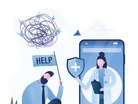Why technology is the answer to the mental health crisis

There has been a marked increase in the demand for mental health services since the pandemic. This is likely to accelerate with the expected increase in the cost-of-living. Yet, while more individuals are seeking out mental health support, the number of psychiatric beds in NHS hospitals in the UK has fallen by a quarter since 2010, with the median waiting time to be seen by a community mental health team now standing at 13 weeks.
“There are myriad factors that underpin this growing chasm between demand and supply for mental health services, but technology may provide one solution to help support services identify requirements and, importantly, intervene earlier,” explains Laura Morrill, Investment Director at ECI Partners. “Making sure face-to-face support is there for individuals is vital, but technology can still help with identifying, evaluating, prioritising and implementing mental health support, easing processes for both patient and provider.”
Here, Morrill shares some ways that technology can help with this.
Plugging the inefficiency gap with top healthcare technology
The process of accessing mental health support can often pose a huge barrier to those seeking help. “People struggling with mental health issues often have to fill out forms and stick to strict appointment timetables that the system requires, for example. This can lead those in need of support to fall through the safety net, something that creates inefficiencies in the system and that ultimately leads to poor outcomes for patients,” says Morrill. “Technology can provide simple fixes. For example, scheduling software can be implemented to remind a patient of their appointment with a ‘day-of’ text. Other innovations within the space include a HIPAA-compliant Zoom service which grants practices compliant video technology, and treatment monitoring capabilities that can help patients to keep track of their medication and next steps in their care plan.
“Even incorporating basic infrastructure such as online appointment bookings and electronic patient record systems will create higher quality data and greater efficiencies in the system, allowing healthcare professionals to service more patients and meet the growing demand for mental health services.”
Laura Morrill, Investment Director at ECI Partners
It takes an (online) village, digital healthcare can support patients
It’s not surprising that a study by Mind found that a lack of personal contact and loneliness during the pandemic contributed to a rapid rise in the severity of mental health challenges. Yet it’s clear that the epidemic of loneliness hasn’t subsided with the lifting of lockdown restrictions – the World Economic Forum found that chronic loneliness impacts up to one million more people in the UK than pre-pandemic.
“Online communities can offer a support network and a source of socialisation for those who are experiencing loneliness. Being able to speak with like-minded people who can provide support and offer a sympathetic ear can vastly boost an individual’s wellbeing. By making connections in a safe and secure community, people can also be signposted to the correct resources to prevent their situation from getting worse,” explains Morrill.
Mental health support with apps
“To meet the challenges of the ongoing global mental health crisis, there has been a flurry of app development in this space,” says Morrill. “Apps can offer quick and convenient resources, without the need to book appointments, and provide an accessible starting point for awareness and education. They can also allow tracking of data and behaviour patterns to provide a signal that help is needed before a crisis. Success stories include R;pple’s Suicide Prevention, which intercepts harmful searches around suicide and self-harm, and provides a message of hope as well as access to 24/7 mental health charity partners available via phone or webchat.
“Despite the benefits of apps, it’s important to remember that there is little industry regulation and evidence around app effectiveness, which may result in healthcare professionals’ and consumers’ struggling to find the right platform. However, it’s likely that within the next five years this will shift with a tightening of regulation and a validation of clinical-quality apps.
“Technology has an important role to play in helping clinicians and patients achieve better outcomes for mental health and de-escalate conditions before they worsen. Whilst it is no substitute for human intervention, it can complement and streamline services to maximise efficiency and remove some of the barriers patients face when it comes to accessing support.”
The mental health crisis shows no sign of abating, and with mental health services needing support from different corners, technology surely has an important role to play.
- AstraZeneca CSO Pam Cheng: Health Equity & SustainabilitySustainability
- McKinsey, GSK & Novo Nordisk: This Week in HealthcareTechnology & AI
- How Cardinal Health Creates Sustainable Supply ChainsMedical Devices & Pharma
- Oxford University: Is AI Reliable in Healthcare & Medicine?Technology & AI



